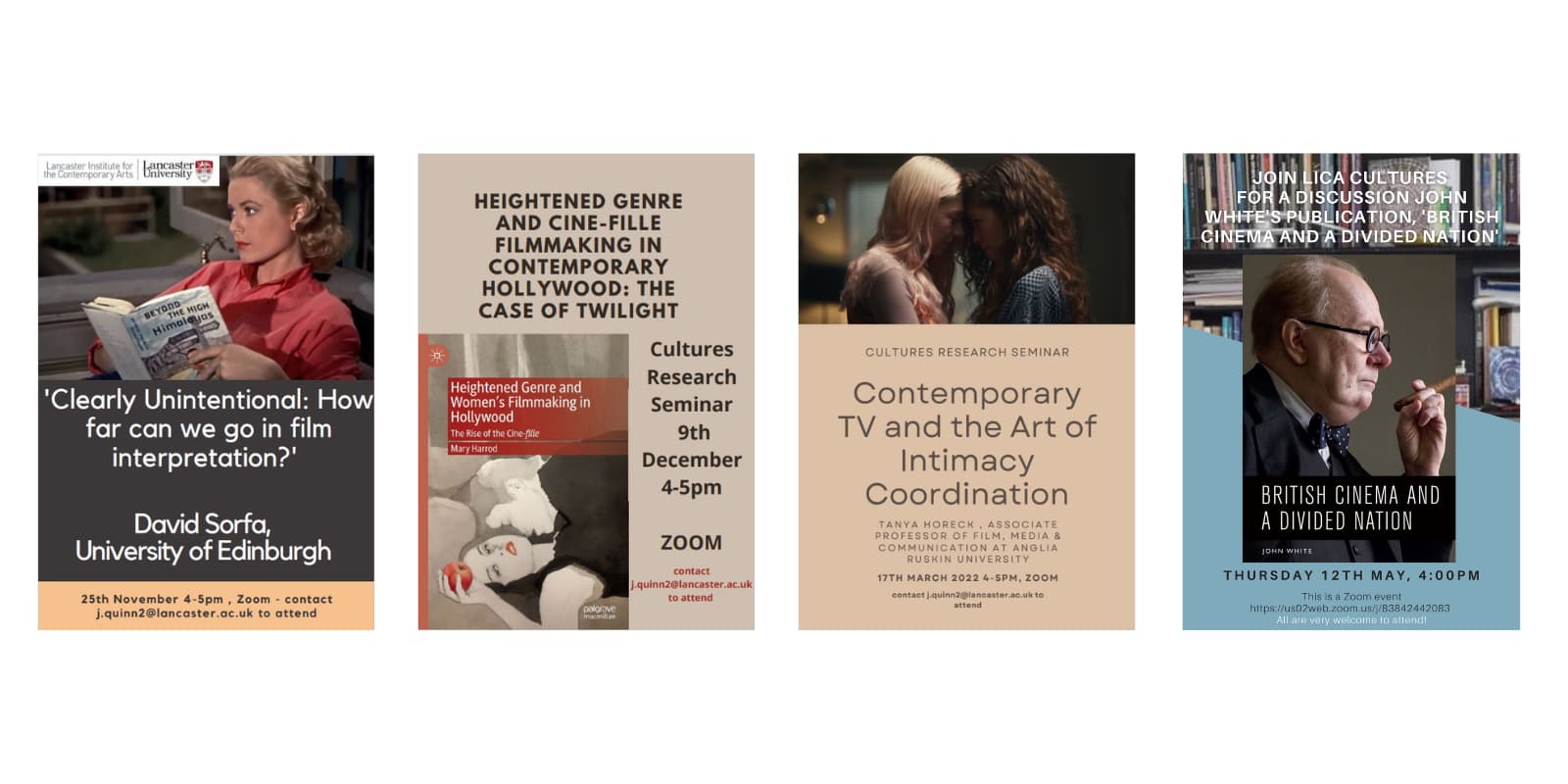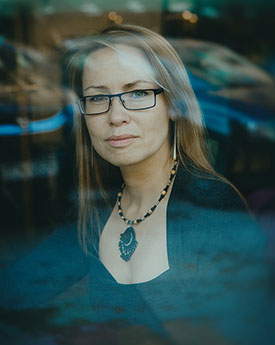
Creative Cultures and Context
The Creative Cultures and Context research centre brings together colleagues from a variety of disciplines – from Architecture to Theatre – to conduct historical and theoretical research about art, cultures, and interconnecting lives across Europe, China, Latin America, and beyond.
Colleagues in Creative Cultures and Context advance critical and theoretical understanding of the contemporary arts which spans and informs a range of themes, including:
- Identity, feminism, gender, sexuality, race
- Sensory perception in art, dance, and design
- Global politics and the Arts
- Transnational currents in art, design, film, and theatre
- Mobilities research, borders, and migration
- Theatricality in art, film, and theatre
-
Meet our members
Loading People
The Cultures Podcast
Listen to LICA's series of podcasts on culture, art and life.
.png)
View our latest publications

Royal Court: International, E. Aston & M. O'Thomas
The first ever full-length study of the Royal Court Theatre's International Department, covering the theatre's unique programming of international plays and seasons, its London-based residences for writers from overseas, and the legacies of workshops conducted in more than 30 countries.

Teaching Transnational Cinema by Bruce Bennett
This collection of essays offers a pioneering analysis of the political and conceptual complexities of teaching transnational cinema in university classrooms around the world. In their exploration of a wide range of films from different national and regional contexts, contributors reflect on the practical and pedagogical challenges of teaching about immigrant identities, transnational encounters, border politics, and race.
Teaching Transnational Cinema
Cycling and Cinema by Bruce Bennett
Cycling and Cinema explores the history of the bicycle in cinema from the late nineteenth century through to the present day. In this new book from Goldsmiths Press, Bruce Bennett examines a wide variety of films from around the world, ranging from Hollywood blockbusters and slapstick comedies to documentaries, realist dramas, and experimental films, to consider the complex, shifting cultural significance of the bicycle.

Asian Cinema Journal, ed Gary Bettinson
Asian Cinema is a peer-reviewed journal that publishes a variety of scholarly material – including research articles, interviews, book and film reviews and bibliographies – on all forms and aspects of Asian cinema. The journal’s broad aim is to advance understanding and knowledge of the rich traditions of the various Asian cinemas, thereby making an invaluable contribution to the field of film studies in general.

Superman the Movie The 40th Anniversary Interviews
Marking 40 years since the film’s commercial release, Gray Bettinson's book presents original interview transcripts with the cast and crew that, when read together, serve as a rare insider account of an acclaimed blockbuster whose production was steeped in controversy. The interviewees cast light on the daily reality on set, as well as the film’s release and reception with refreshing candour.

Otto Preminger Interviews by Gary Bettinson
A collection of interviews with the prolific Austro-Hungarian-born director known for challenging the status quo in Hollywood throughout his trailblazing career directing films like The Moon is Blue, The Man with the Golden Arm, and Anatomy of a Murder.

Cold War Cities ed. by Richard Brook et al
This book examines the impact of the Cold War in a global context and focuses on city-scale reactions to the atomic warfare. It explores urbanism as a weapon to combat the dangers of the communist intrusion into the American territories and promote living standards for the urban poor in the US cities.
Cold War Cities: Politics, Culture and Atomic Urbanism, 1945–1965

manchester MODERN by Richard Brook
In “manchester MODERN” Brook presents 111 buildings of the twentieth and early twenty-first century. This new edition records buildings lost to demolition since its first publication in 2017 and reinforces the importance of his ongoing recording of modernist heritage.

The Art of Resistance by Allyson Fiddler
The Art of Resistance traces the aesthetic styles and strategies deployed during the early twenty-first century, providing critical context for understanding modern Austrian history as well as the European protest movements of today.

Vampire Cinema: The First One Hundred Years
Christopher Frayling's coffee table visual feast celebrates a century of classic vampire cinema - mainstream and niche - through the many colourful ways in which the key films have been marketed and consumed, to enter the bloodstream of contemporary world culture.

Unnatural Theology by Charlie Gere
In Unnatural Theology, Charlie Gere provides ways of thinking about the possibilities of religion and theology in the context of our highly technologized postmodernity. Through an interdisciplinary engagement with thinkers, such as Jacques Derrida and Judith Butler, and artists like Marcel Duchamp, Gere develops the notion of an unnatural theology as the basis of a new kind of religious thought that does not insult our intelligence.

I Hate the Lake District by Charlie Gere
I Hate the Lake District offers a different vision of the rural environment from those found in much contemporary nature writing. Based on the author's trips around North West England, the book engages with nuclear power and nuclear war, slavery, imperialism, ghosts, love, God, cockroaches, and the sheer violence and contingency of “nature” itself—of which the human presence is merely a part.

World's End by Charlie Gere
A memoir and cultural history of World's End, a West London area once home to bohemian artists and punk rock and now an outpost of neoliberalism.
Charlie Gere's account of growing up in the World's End area of West London during the Cold War combines local history, cultural history, memoir, and a strong sense of the apocalyptic. Gere has lived long enough to see the World's End now bearing the marks of out-of-control neoliberalism and its grotesque accompanying inequality.

Global Undergrounds ed Carlos López-Galviz et al
Rest your eyes long enough on the skylines of Delhi, Guangzhou, Jakarta—even Chicago or London—and you will see the same remarkable transformation, building after building going up with the breakneck speed of twenty-first-century urbanization. Global Undergrounds offers a richly illustrated exploration of these subterranean spaces, charting their global reach and the profound—but often unseen—effects they have on human life.

Cities, Railways, Modernities by C López-Galvis
Cities, Railways, Modernities chronicles the transformation that London and Paris experienced during the nineteenth century through the lens of the London Underground and the Paris Métro. The book recovers a significant body of work around the ideas, the plans, the context and the building of metropolitan railways in the two cities to provide new insights into the relationship of transport technologies and urban change during the nineteenth century.
.png)
Routledge Handbook of Social Futures
Engaging with key defining questions of the early twenty-first century such as climate change, big data, AI, the future of economics, education, mental health, cities and more, the Handbook provides a review and synthesis of futures scholarship, highlighting the role that societies can and should play in their making.

Women, Feminism and Italian Cinema by D. Missero
This book explores the multiple intersections between feminism and Italian cinema from the perspective of women’s everyday lives and relationship with the medium. Drawing from a feminist approach to Gramscian cultural theory, the book builds an archival counter-history of Italian cinema in which women took part as movie-goers, activists and practitioners.
Women, Feminism and Italian Cinema: Archives from a Film Culture

Elfriede Jelinek in the Arena
Elfriede Jelinek has not shied from the major political topics of our times. The legacy of Nazism, the prevalence of right-wing populism, the war in Iraq, the ongoing financial crisis, humanitarian disasters, misogyny and sexism – all are tackled in formally innovative ways and across a wide range of genres by editors Allyson Fiddler and Karen Jürs-Munby.

A Colourful Presence by Maryam Ghorbankarimi
This book analyzes the changes in the representation of women in Iranian cinema since the 1960s, and investigates the reasons and motives for this. Iranian cinema, both before and after the Islamic Revolution, has been closely monitored by the ruling power, and has been utilized to relay messages and information that comply with the ruling ideology. However, this book explores the changing roles of women in film production and their representation in films made between the 1960s and 2000s.
A Colourful Presence
ReFocus: The Films of Rakhshan Banietemad
In ReFocus: The Films of Rakhshan Banietemad, editor Maryam Ghorbankarimi and her contributors provide a valuable addition to the literature by offering an in-depth study of one of Iran's most significant living directors. The chapters draw on a range of methodological approaches (gender studies, eco-criticism, and sound studies, to name a few) to offer thoughtful analyses of Rakhshan Banietemad's work.

Performance and Politics in a Digital Populist Age
Cami Rowe's publication re-evaluates the role of performance in global politics in the face of populism and the digital mediatisation of political interactions. Drawing on applied theatre practices, this book shows that performance is inherently concerned with cooperative and collaborative encounters across differences, and performance might therefore support effective responses to digital populism.
Performance and Politics in a Digital Populist Age
Deleuze and Lola Montѐs by Richard Rushton
Gilles Deleuze represents the most widely referenced theorist of cinema today. And yet, even the most rudimentary pillars of his thought remain mysterious to most students (and even many scholars) of film studies. Rushton provides an interpretation of Max Ophuls's classic film Lola Montès as an example of how Deleuzian film theory can function in the practice of film interpretation.

On Theatricality - R. Rushton & A. Quick
What is Theatricality? The contributions in this issue ask these and other questions in relation to a wide range of performance examples and possibilities. These include articles on The Wooster Group, Jan Fabre, Marina Abramović, Robert Wilson, and Goat Island, as well as reflections on theatricality and skill, sound, grief and violence, and on the politics of theatricality, theatricality and disability and immersive theatricality.

Modern European Cinema and Love by Richard Rushton
Modern European Cinema and Love examines nine European directors whose films contain stories about romantic love and questions the institutions of marriage and the 'couple'. The book approaches questions of love and marriage from a philosophical perspective and trace love and marriage from a psychoanalytical perspective through the works of Jean Renoir, Ingmar Bergman, Alain Resnais, Jean-Luc Godard and others.
.png)
Stalin's Architect by Deyan Sudjic
The first biography to trace the remarkable life and career of Ukrainian-born Boris Iofan, beautifully illustrated with many of Iofan's previously unseen sketchbooks and photographs from private collections. This is a history of architecture, politics and power.

John Pawson: Making Life Simpler by Deyan Sudjic
The only comprehensive book on the fascinating life and work of the celebrated architectural designer, John Pawson. This visual biography brings together John Pawson’s architecture, life, clients, travel, photography, design, books, and ideas.

Terence Conran: Making Modern Britain
Terence Conran shaped the culture of everyday life in Britain for more than four decades. This book explores seven themes, from his early influences to his own work as a designer, and from food to business, which convey a truly complex yet unique character. Above all, he was a tastemaker who made a lasting impact on the making of modern Britain.

Theatricality and the Arts, A. Quick & R. Rushton
This is the first book collection to consider the notion of theatricality across a range of creative fields. Theatricality and the Arts presents a series of investigations of the notion of ‘theatricality’. Primarily, theatricality concerns that which pertains to theatre, but the term has always carried with it the potentially pejorative associations of exaggeration and fakery. The essays here question and contest such associations.
Theatricality and the ArtsCinema Memory and the Digital Archive (CMDA)
Cinema Memory and the Digital Archive (CMDA) is about expanding our knowledge and understanding of how audiences relate to and remember the experience of cinemagoing. How is ‘going to the pictures’ remembered? How may these remembered experiences be expressed? In speech? In writing? Through a range of creative practices? What can such expressions tell us about how our memories of ‘going to the pictures’ figure in our daily lives?

The project’s starting point is the materials gathered in the course of ‘Cinema Culture in 1930s Britain’ (CCINTB), all of which are housed in Special Collections at Lancaster University Library. This valuable resource had previously been available to view only for those able to visit Lancaster in person.
Engaging 21st-century developments in digital humanities, Cinema Memory and the Digital Archive expands academic and public knowledge of these key aspects of the cinema experience. The entire CCINTB Collection is in the final process of being accessioned, catalogued, and digitised. Among the project’s principal outputs is a freely available website incorporating the CCINTB Collection and a range of other historical materials related to cinemagoing in interwar Britain and the cinemagoing experience more generally.
The CMDA website is accessible and valuable to anyone with an interest in cinema history, cultural history, cultural memory, and even family history. Searching the digital archive is designed to be intuitive, and the website is easy to navigate for everyone from first-time users of online archives to seasoned researchers.
In addition to the website, a number of public events and activities – including seminars, screenings, workshops and artists’ residencies – were held throughout the duration of the project, to help showcase the contents of the collection. Full details of these activities were publicised through the project blog and Twitter feed, with more to take place over the coming year.
CMDA affiliated colleagues:
- Professor Richard Rushton, Lancaster University, Institute for Contemporary Arts
- Professor Annette Kuhn, Queen Mary University of London, School of Languages, Linguistics and Film
- Professor Sarah Neely, University of Glasgow, School of Culture and Creative Arts
The CMDA project is funded by the Arts and Humanities Research Council (AHRC)
LACE3: experiment, explore, and enquire
LACE3 is Lancaster University’s Arts and Creativity unit for experimentation, exploration, and enquiry. It is an agile research and consultancy cluster that draws together expert interdisciplinary teams to undertake work across and within sectors. While the arts and creativity are the group's core focus, their work brings together experts from psychology, history, organisational science, sociology, computer science, and other disciplines as required, to generate productive perspectives.

LACE3 is led by Professor Judith Mottram, forming core teams with colleagues from within the Lancaster Institute for the Contemporary Arts and other departments at Lancaster University, as well as with external specialists.
Enquiries about working with LACE3 can be directed to Judith Mottram.
Teams are put together in response to the needs of clients or research opportunities, drawing on our wide networks of contacts in many disciplines throughout the UK. Consultancy work is carried out within the frameworks of the Lancaster University Consultancy Service supported by the infrastructure and frameworks of the University.
LACE3 affiliated colleagues:
- Dr Rachel Perry, LICA
- Professor Emma Rose, LICA
- Professor Sandra Kemp, Ruskin Museum
- Dr Dee Hennessy, Creative Exchange
- Professor Niall Hayes, LUMS
- Professor Theo Vurdubakis, LUMS
- Professor Lynn Froggett, UCLAN
Art of Recovery
Professor of contemporary arts Emma Rose led a research team from Lancaster University to collaborate with refugee survivors of torture, in partnership with the charity Freedom from Torture, Manchester, UK. The project used qualitative participatory co-design research to explore the potential benefits and challenges of artmaking in supporting recovery from extreme trauma.
.jpg)
The project used qualitative participatory co-design research to explore the potential benefits and challenges of artmaking in supporting recovery from extreme trauma.
The project identified six key findings from research data; that included ten participatory art workshop sessions working with 12 participants, their interpreters and therapists as support, data from the WHO 5 Wellbeing Index, post-workshop interviews, and a concluding reflective review panel. The project produced 3 journal articles and an edited volume of essays.
This ‘toolkit’ developed from the Art of Recovery project, is presented as a series of cards offering suggestions for setting up participatory art workshops in the context of recovery with refugees. The toolkit is designed to be used by a range of participatory art groups convened by informal or professional caregivers, community support or self-help groups, or researchers working in conjunction with therapists.
Latest News
More News
Projects
In This Moment (2023)
01/12/2022 → 10/02/2024
Other
E3: The Landscapes of Post-War Infrastructure: Cooling down
07/11/2022 → 30/11/2023
Research
E3: The Landscapes of Post-War Infrastructure: Culture, Amenity, Heritage and Industry
07/11/2022 → 31/08/2024
Research
Future Places: A Digital Economy Centre on Understanding Place Through Pervasive Computing
01/10/2020 → 30/09/2025
Research
Slots
01/08/2020 → 30/04/2021
Other
GCRF: Gridding Equitable Urban Futures in Areas of Transition (GREAT) in Cali, Colombia and Havana, Cuba
01/04/2020 → 30/06/2024
Research
Cinema Memory and the Digital Archive: 1930s Britain and Beyond
04/06/2019 → 28/10/2022
Research
Cultural Politics of Sustainable Urban Mobility, 1890 to the present
15/09/2015 → 15/12/2018
Research










































